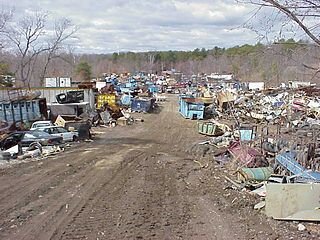
I understand why Dan used gold and silver as the currency of Mutant Future (to make the economy as simple as possible), but I don't like it. I didn't like the credit cards in Gamma World and think the idea of universal money is weird for a post apocalyptic game. So here are some ideas, some very cliche, of what might be used as currency for different regions. Some places will consider the money of others to be humorous at best and an insult at worst. Smart players will scout a community they come across before attempting to buy something.
Bullets, food, salt, minor artifacts and spare parts are the cliches. They are also very important to many communities and likely to be used as money somewhere. Having some of them on hand is a good idea for explorers. Water is not here because it is valuable only in large quantities and the PCs probably can not carry enough. A gallon of water isn't worth that much. It will keep a person alive for a few more hours (or a day or two) but communities will already have access to water or they won't exist. It is different as emergency supplies but that is different from a trade good.
Heating oil, waterproof cloth, engineered wood or coal (they last a long time as fuel), insect repellent and healing herbs all relate to survival. Weather should be a concern in some Mutant Future settings- it kills a lot of people in the real world and probably many more in a post apocalyptic one. As trade goods, these have a high value but some PCs may find it difficult to part with them. Doing so may be the death of the party.
There are the oddities such as uncorroded metal, unworked plastic, mutant parts, solar cells (these are from the 92 edition of Gamma World) and "gems". The last one are actually quartz hard drives, either whole one or in parts. These kinds of goods are important but only to those who can use them. Some communities will have no use at all for plastic except as something to burn. Others can use the cells to recharge power packs but have no artifacts to power as their last ones were destroyed in a flood or invasion.
There are the non-goods such as slaves, livestock and labor. All of them have great value but finding people willing to accept them may be difficult. In some regions, labor may be the most desired commodity- get strangers, slaves, or the poor to do all the dangerous work. Of course strangers and new slaves will be constantly watched, lest they be spies or sabotours. Mutants will be considered the most dangerous as many mutations are not visible until they are used (or not even then). Many communities will not allow strangers into their central living spaces but may use their work outside it.
And then there is barter. The PCs wander in from the wastes and might have to be willing to trade some of their hard won gear to get the food, water and shelter needed to survive. This is similar to taxes in fantasy games but it can hurt much more. It is also a reason why PC and NPC explorers are so common- it is the only way they can survive.
Remember that not everyone knows what they are buying or selling. That is the reason television has so many series such as the Antique Roadshow. Shopping in the wastes can be an adenture in of itself.



